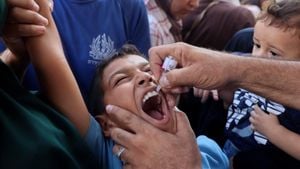Los Angeles District Attorney George Gascón is making headlines with his recent announcement about the Menendez brothers, Lyle and Erik, who have been behind bars for over three decades for the murder of their parents, José and Kitty Menendez, back in 1989. Gascón will request the court to reduce their sentences from life without the possibility of parole to 50 years to life, opening the door for potential parole eligibility. This significant move has sparked discussions, especially considering it coincides with Gascón's reelection campaign.
At a press conference, Gascón explained his rationale, stating, “I came to a place where I believe under the law resentencing is appropriate,” citing the brothers' 34 years of incarceration and their efforts at rehabilitation during their time behind bars. He emphasized the need to evaluate the case with fresh eyes, especially considering the sensitive issues surrounding the family dynamics, including allegations of abuse they claim to have suffered at the hands of their father.
Support for the brothers is palpable within their extended family. Anamaria Baralt, a cousin, expressed gratitude for Gascón's leadership, hopeful for justice and the chance for the brothers to return home. If the request is granted by the judge, the Menendez brothers would still need to appear before the state Board of Parole Hearings to assess their suitability for release.
Not everyone shares the same sentiment, though. There is notable opposition from certain family members, particularly from Milton Andersen, Kitty's brother, who believes the original jury's verdict served justice. His attorney has openly condemned Gascón for not keeping Andersen informed of the developments surrounding the distressing case.
Should the judge find it sufficient, he could deny the D.A.'s request if concerns are raised about the brothers posing any danger upon their release, though this is often challenging to substantiate. With their classification as youth offenders due to their ages at the time of the crime—18 and 21—they would qualify for parole almost immediately if resentenced to the lighter term.
The contrasting opinions bring tension to the case, illustrating the deep divide even within families affected by horrific events. Gascón’s administration has faced scrutiny from groups like the Association of Deputy District Attorneys, which criticized him for allegedly prioritizing celebrity cases over victims’ rights. Concerns about the timing of his announcement have also emerged, especially as it approached the imminent election. Nathan Hochman, his opponent, insinuated Gascón's actions were politically motivated, contributing narratives of scandal and sensationalism around the brothers' case.
Reflecting on the broader picture, the Menendez case has garnered renewed attention through media portrayals, including the Netflix series “Monsters: The Lyle and Erik Menendez Story,” which helped revive public interest. The show, along with other documentaries, reignited discussions about their past and the implications of their long sentences.
Alongside the legal proceedings, social media buzz and public discourse highlight the Menendez brothers' story as more than just a scandal; it serves as a cultural touchstone, sparking conversations about family dynamics, societal justice, and the legal system's response to such traumatic narratives. Advocates like Kim Kardashian have taken the brothers' cause up publicly, pushing for their release and gaining widespread media attention.
Given the back-and-forth arguments, the stakes remain high for both the Menendez brothers and the extended family. If the court and parole boards do not grant their release, the brothers could remain incarcerated under the harshest terms. But if Gascón's request gains traction, the brothers could secure their parole under newly articulated laws about youth offenders, setting precedence for rehabilitation over vengeance.
The Menendez brothers' case continues to ripple through the public consciousness as it intertwines with narratives of celebrity, justice, family, and media. With the tension rising, what happens next will undoubtedly influence the discourse surrounding the justice system and its reconciliation with past actions and societal responsibilities.
It's worth noting the continued interest surrounding their plight reflects broader public sentiments about reform, rehabilitation, and societal forgiveness, particularly for individuals who have demonstrated genuine attempts at change during their confinement.



